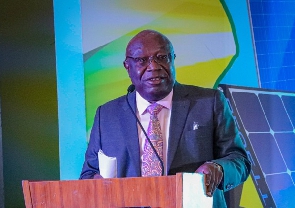- Home - News
- TWI News | TV
- Polls
- Year In Review
- News Archive
- Crime & Punishment
- Politics
- Regional
- Editorial
- Health
- Ghanaians Abroad
- Tabloid
- Africa
- Religion
- Election 2020
- Coronavirus
- News Videos | TV
- Photo Archives
- News Headlines
- Press Release
Business News of Thursday, 17 November 2022
Source: thebftonline.com
Local building material producers need support to bridge housing deficit – Dr Kwaku Afriyie
Minister of Environment, Science, Technology and Innovation (MEST), Dr. Kwaku Afriyie, has stressed the need to support producers of local building materials, particularly those into sustainable and environmental-friendly production such as plastic blocks and tiles, among others – saying such a move will address affordable housing challenges.
Recent data from the Ghana Statistical Service (GSS) on housing disclosed that the national housing deficit stands at 1.8 million, a 33 percent reduction from the previous 2.8 million.
Also, it indicates that 12.7 percent of the total housing structures are vacant with variations across the 16 regions, which among other reasons is due to non-affordability.
In view of this, the minister said his outfit will liaise with respective authorities – including the ministry of works and housing – to support plastic waste recyclers who are turning the waste into affordable building materials to serve the housing needs of Ghanaians better while addressing the plastic menace.
“This is a collaborative effort; I am here to know the nature of the problem… We can tweak our policies such that if the clays they are making are suitable and not too hot but cooler for ordinary concrete, then we will look at it. If the price is so good and it demonstrates that it can last for so long, then I see government tweaking the policy and saying if you want to build primary schools, we should use these kinds of materials. At least, we can pilot some of them. So, I can lead them to government, assemblies and the public sector so we can initiate policies which can even help the industry,” he said after touring some plastic waste management companies," he said.
The minister indicated that his outfit is working together with Local Government, Decentralisation and Rural Development (MLGDRD), Sanitation and Water Resources (MoSWR), Fisheries Aquaculture and Development (MoFAD), among other ministries, to deal with plastic waste menace by promoting the domestic recycling industry, and providing appropriate policy, legislation and regulatory frameworks which protect both the environment and the industry.
“We are all witnesses to how plastics have been indiscriminately disposed into our water-bodies, drains, gutters etc., resulting in perennial floods across the country – especially Accra and Kumasi. The situation is even worse in the Northern part of the country, as plastic is littered all over the environment," the minister stated.
“The current state of plastics management in the country requires an intense public campaign to engage citizens, businesses, schools, hospitals and other institutions, especially the media, to enhance behavioural change. Government, on the other hand, will create the enabling conditions to facilitate access to the sustainable financial resources needed to set up the structures and facilities for an effective roll-out of the National Plastics Policy implementation plan,” he said.
The minister also added that concerns raised by the waste management companies will be duly considered.
For his part, the founder of Nelplast Ghana – an industrial processing company that specialises in recycling plastic waste into different varieties of products, including building materials – Nelson Boateng, said government must also provide support to companies in the form of soft loans or grant to enable them expand their activities in the quest to manage plastic waste.
He also expressed worry over the high cost of electricity, which he said is hampering the cost of production.
“Our electricity bill is killing us; government should help us with subsidies. We need grants or soft loans to expand our operations because we have more plastic coming in than we can recycle," he stated.
“Now we are doing 3,000kgs and our collectors have the ability to collect about 20,000kgs, so we need to expand in order to recycle all the plastic waste they bring to us on daily basis; thus the 20,000kgs. But if we turn them away because we do not have the capacity, it discourages them and causes them to stop collecting – the reason we are seeing more plastic on the street,” he said.
Other recyclers, including CEO of SRG Industries, Hussein Jaber, added their voices on the need to address high electricity cost – adding that his outfit is committed to assisting government manage waste; however, he hopes every pledge to assist the industry does not end just being lip-service.











